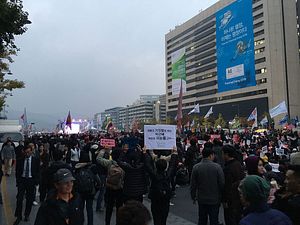The past few months have marked one of the most dramatic periods of political chaos and turmoil in contemporary Korean politics. Grievance, resentment, and fury all have swept through the entire Korean society – the ruling and the opposition parties, the left and the right, conservatives and progressives. In addition to political scandal, South Korea has been debating the pros and the cons in respect to a number of daunting but crucial issues including the deployment of the U.S. Terminal High Altitude Area Defense (THAAD) system.
The fall of a female legend, a “political princess” and the very first woman president in South Korea’s constitutional history, has been followed by the rise of a “civilian successor.” Park Geun-hye, daughter of long-time strongman Park Chung-hee, was impeached over an influence peddling scandal; new President Moon Jae-in lacks Park’s political pedigree and instead has a strong background in civil society. People now expect some brighter changes to come under the new president’s lead, though it is still quite unclear how positive and how different any changes might be. Moon’s subtly different attitudes — for example his approach toward Park’s decision on THAAD deployment before and after his electoral victory — may have already proved, partially at least, that South Korea’s political reality and pattern remains mostly unchanged.
There is a saying: “Character determines fate.” This saying might be used to explain Park’s rise and fall. But to go a little further, are there any connections between the recent political turmoil and the nature or characteristics of South Korea’s domestic politics as a whole? Kim Young-Myung, a professor at Hallym University in South Korea and author of The Nature of Korean Politics (2016), thinks so. Kim claims that “three special conditions” have decided “six special phenomena” in South Korea’s politics.
The “three special conditions” are: separation (between the North and the South), compressed growth, and the culture of a homogeneous society. The “six special phenomena” include: concentration of ideology, class, and region; partisan fighting; politics of the person (as opposed to the party); emotional fluctuation; cohesiveness; and stability.
Kim’s diagnosis may provide an alternative way to understand current South Korean politics. First, as a homogeneous society that has long been guided under certain doctrines like “anti-Communism” and the “North threat theory,” political decision-making processes, particularly those related to the North and other major powers, have largely fluctuated ideologically and even “emotionally,” causing serious (and at times unintended) consequences for South Korea’s external relations.
Partisan fighting in South Korean politics is another dramatic story — it goes beyond the pattern of inter-party competition and results in intra-party divergence, conflict, and even critical stand-offs, as seen in the fight between the pro-Park and the anti-Park factions in the former Saenuri Party during the recent scandal. Another interesting but somewhat odd characteristic in South Korea’s party politics lies in the fact that party members do not seem to have substantial loyalty to the party. Indeed, the names of political parties have changed frequently and new parties are constantly convened as the result of various intra-party disagreements and stand-offs. Thus Saenuri, itself formed only in 2012, is already defunct, having split into the Liberty Korea Party and the Baerun Party.
Meanwhile, Kim’s “special phenomena” of cohesiveness and stability can be put in a relatively more positive context. After chaos and turmoil, unanimous consensus about social and political stability is generally reached among the public and different political factions. The recent upheaval is no example — the major national apparatus, including the legal system, did not fail, and a new president was successfully elected in crisis. This is a very noteworthy end to the past few months’ chaos – what some would call the “true spirit” of a free democratic society.
But in the long term, the question for South Korea is this: as the separation protracts, compressed growth ebbs, and the homogeneous Society meets with diversified (internal and external) challenges, how long will Kim’s “six special phenomena” sustain? The chance is that there of course we might see the birth of new “special phenomena.” Take Moon’s popularity among the young South Koreans as an example. The emerging political indifference among younger generations, ironically, may contribute to the “rebirth” of South Korean politics – possibly less ideological and less emotional, but more rational and focused on livelihood issues. If this truly happens, the consequences and implications will be far-reaching.
































